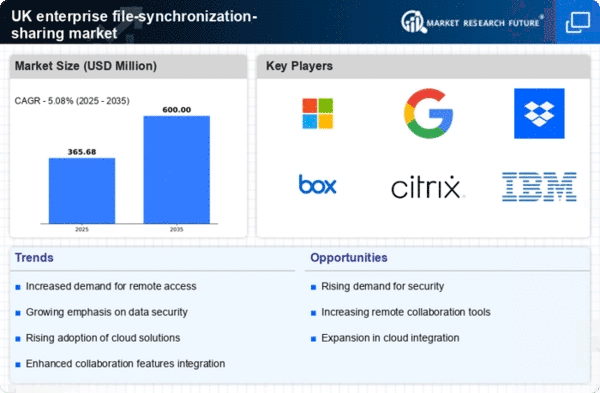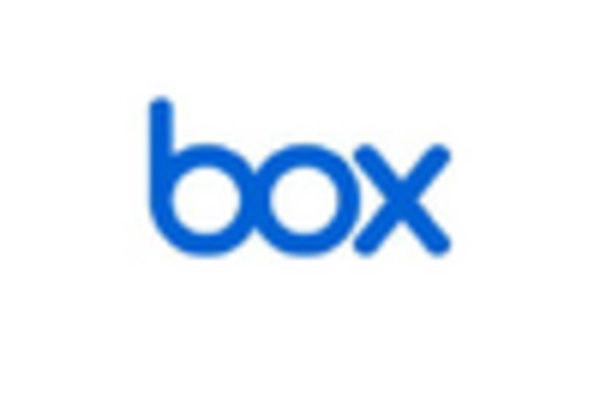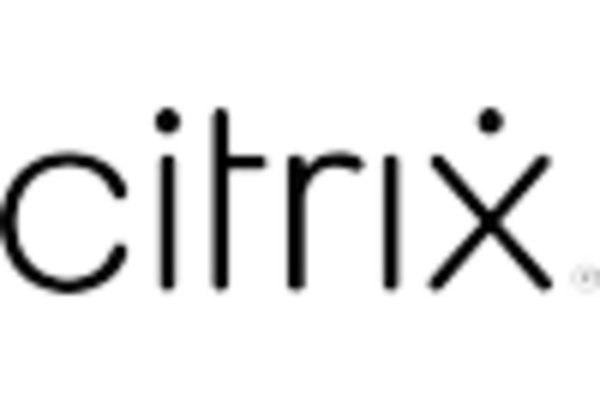Increased Focus on Cost Efficiency
Cost efficiency remains a critical driver in the enterprise file-synchronization-sharing market. UK organisations are continually seeking ways to optimise operational costs while maintaining productivity. The adoption of cloud-based file-sharing solutions has emerged as a viable strategy to reduce expenses associated with traditional on-premises systems. By leveraging cloud technology, businesses can eliminate the need for extensive IT infrastructure and reduce maintenance costs. Reports suggest that companies can save up to 30% on operational costs by transitioning to cloud-based file-synchronization solutions. This financial incentive encourages organisations to invest in enterprise file-synchronization-sharing tools that align with their cost-saving objectives, thereby stimulating market growth.
Rising Importance of Data Analytics
The enterprise file-synchronization-sharing market is increasingly influenced by the rising importance of data analytics. UK businesses are recognising the value of data-driven decision-making, prompting a demand for file-sharing solutions that incorporate analytics capabilities. By leveraging data analytics, organisations can gain insights into file usage patterns, user behaviour, and collaboration efficiency. This information enables businesses to optimise their file-sharing practices and enhance overall productivity. As a result, enterprise file-synchronization-sharing tools that offer integrated analytics features are likely to gain traction in the market. The potential for improved operational efficiency through data insights positions analytics as a key driver in the evolution of the enterprise file-synchronization-sharing market.
Growing Demand for Remote Work Solutions
The enterprise file-synchronization-sharing market experiences a notable surge in demand for remote work solutions. As organisations in the UK increasingly adopt flexible work arrangements, the need for secure and efficient file-sharing systems becomes paramount. According to recent data, approximately 60% of UK businesses have implemented remote work policies, driving the necessity for robust file-synchronization tools. These tools facilitate seamless collaboration among distributed teams, ensuring that employees can access and share files securely from various locations. This trend indicates a shift towards digital transformation, where businesses prioritise technology that enhances productivity and collaboration. Consequently, the enterprise file-synchronization-sharing market is likely to expand as companies seek solutions that cater to the evolving work environment.
Regulatory Compliance and Data Protection
The enterprise file-synchronization-sharing market is significantly influenced by the increasing emphasis on regulatory compliance and data protection. In the UK, businesses are required to adhere to stringent regulations such as the General Data Protection Regulation (GDPR), which mandates the secure handling of personal data. This regulatory landscape compels organisations to invest in file-sharing solutions that not only facilitate collaboration but also ensure compliance with legal requirements. As a result, the demand for enterprise file-synchronization-sharing tools that offer robust security features, such as encryption and access controls, is on the rise. It is estimated that compliance-related investments in technology could reach £1 billion by 2026, further propelling the growth of the enterprise file-synchronization-sharing market.
Technological Advancements in File Sharing
Technological advancements play a pivotal role in shaping the enterprise file-synchronization-sharing market. Innovations such as enhanced encryption methods, artificial intelligence integration, and improved user interfaces are transforming how organisations manage and share files. In the UK, the introduction of advanced features, such as real-time collaboration and automated file versioning, is becoming increasingly prevalent. These advancements not only enhance user experience but also address security concerns, making file-sharing solutions more appealing to businesses. As technology continues to evolve, the enterprise file-synchronization-sharing market is expected to witness sustained growth, driven by the demand for cutting-edge solutions that meet the needs of modern organisations.
















